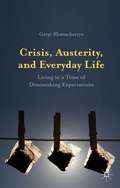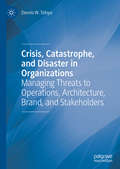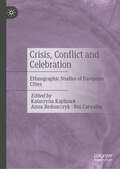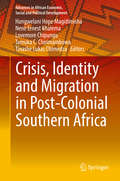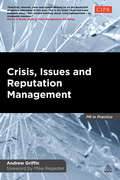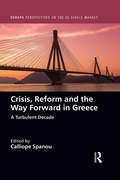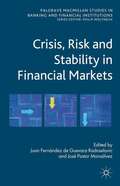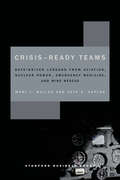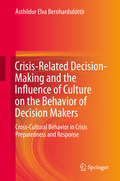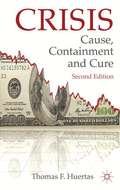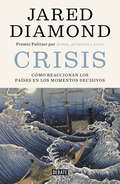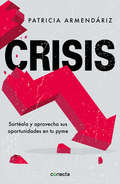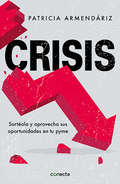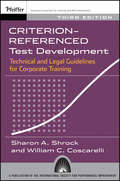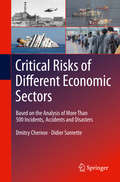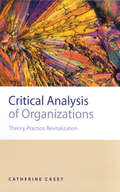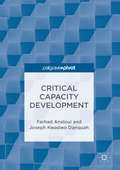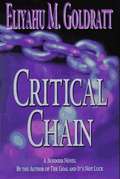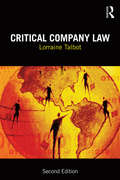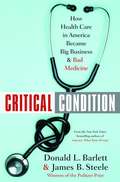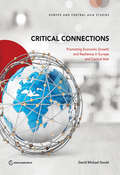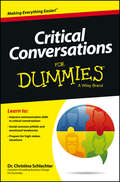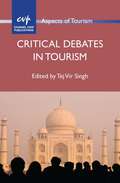- Table View
- List View
Crisis, Austerity, and Everyday Life: Living in a Time of Diminishing Expectations
by Gargi BhattacharyyaWill austerity never end? This timely and insightful book argues that austerity seeks to set the terms of political and economic life for the foreseeable future, extending techniques of exclusion to ever-greater sections of the population.
Crisis, Catastrophe, and Disaster in Organizations: Managing Threats to Operations, Architecture, Brand, and Stakeholders
by Dennis W. TafoyaThis book explores how and why an event is a precursor to the emergence of a crisis and how a given crisis affects an organization and its stakeholders. Using existing systems theory blended with innovative use of wave, epidemiological, immunological and psycho-social theories, the author discusses ways to understand the effects of different types of crises while showing how to document and/or quantitatively measure those effects. The book offers new models illustrating how events trigger crises and how they subsequently morph into catastrophes and disasters. Using theories and tools tested in organizational settings to identify contributors to a traumatic event, this book makes a valuable contribution to organizational and crisis management literature.
Crisis, Conflict and Celebration: Ethnographic Studies of European Cities
by Katarzyna Kajdanek Anna Bednarczyk Rui CarvalhoThis book illuminates how the profound challenges faced by contemporary societies over the past few decades, encompassing climate change and other environmental risks, global health threats, warfare, and mass migration, manifest themselves in European cities. The chapters bring cutting-edge ethnographic studies which address these complex issues through three key conceptual dimensions of urban life: crisis, conflict, and celebration. The concept of crisis is critically explored in its various economic, political and cultural dimensions affecting urban residents in multiple social and spatial aspects of their lives. Crises often lead to conflicts, dynamic processes that give rise to interest groups and complex social landscapes of resistance. By examining conflicts in urban contexts, the book uncovers the power dynamics and vulnerabilities emerging during turbulent times. Crises and conflicts also present opportunities for urban transformation and regeneration, bringing underlying beliefs and norms into question, paving the way for new social dynamics within urban environments. These conflictual spaces can therefore become arenas for celebration of urbanity, where communities express resilience, cultural identity, and collective solidarity. As well as providing new insights into the present and future of European cities and the pivotal role of urban areas as centers of social change, contestation, and community-building, the book provides an important methodological contribution through innovative qualitative research in a diverse range of European urban areas.
Crisis, Identity and Migration in Post-Colonial Southern Africa (Advances in African Economic, Social and Political Development)
by Nene Ernest Khalema Hangwelani Hope Magidimisha Lovemore Chipungu Tamuka C. Chirimambowa Tinashe Lukas ChimedzaThis book offers a socio-historical analysis of migration and the possibilities of regional integration in Southern Africa. It examines both the historical roots of and contemporary challenges regarding the social, economic, and geo-political causes of migration and its consequences (i. e. xenophobia) to illustrate how 'diaspora' migrations have shaped a sense of identity, citizenry, and belonging in the region. By discussing immigration policies and processes and highlighting how the struggle for belonging is mediated by new pressures concerning economic security, social inequality, and globalist challenges, the book develops policy responses to the challenge of social and economic exclusion, as well as xenophobic violence, in Southern Africa. This timely and highly informative book will appeal to all scholars, activists, and policy-makers looking to revisit migration policies and realign them with current globalization and regional integration trends.
Crisis, Issues and Reputation Management
by Andrew GriffinThe reputation of an organisation influences who we buy from, work for, supply to and invest in. In today's complex environment, organizations have to understand and respond rapidly to shifting public values, rising expectations, demands for public consultation and increasingly intrusive news media. This is particularly important when things go wrong. Crisis, Issues and Reputation Management outlines a comprehensive approach to managing situations that may turn into crises; handling crises once they occur; and features a wide range of case studies of brands who have had to respond to a variety of crises including Nestle, Unilever, General Electric, McDonald's, Coca-cola, Cadbury, Tesco, Pan Am, RBS and more. Crisis, Issues and Reputation Management defines reputation, explores how to value it and provides practical guidelines for effective reputation management, including advising companies on how to approach issues of Corporate Social Responsibility.
Crisis, Reform and the Way Forward in Greece: A Turbulent Decade (Europa Perspectives on the EU Single Market)
by Calliope SpanouThis volume discusses different aspects of Greece’s political economy during the past decade and reflects on the country’s path ahead, examining the major question: did this challenging period succeed in providing a window of opportunity for deeper institutional and societal change? The authors seek to contribute to the discussion of the dynamics of stability and change, of the nexus between external pressure and domestic agency. Greece offers a most interesting case study, as much in analytical as in empirical terms. Never before did a euro area member require three macroeconomic adjustment programmes under stringent policy conditionality and external supervision. This experience shattered past certainties and reshaped the political landscape. A decade later Greece was starting to recover and received international recognition for its reform efforts. However, the COVID-19 pandemic provided an external shock that risks derailing such achievements. The volume includes chapters by academics and researchers from different professional backgrounds: history, economics, public law, political science, public administration and political economy. Their diverse experience and viewpoints contribute to multidimensional analyses in subject areas such as Greece’s constitutional structure, public sector reforms, labour market developments, China’s expanding investment footprint and product market reforms.
Crisis, Resilience and Survival
by Holweg, Matthias and Oliver, Nick Matthias Holweg Nick OliverCrisis, Resilience and Survival charts the evolution of the global automotive industry, revealing the pressures and challenges facing firms in this huge but turbulent realm of business. Long-term overcapacity and swings of the economic cycle mean that many car companies are in financially perilous positions. Yet failures of auto companies are rare, and many have bounced back from the brink. Using the concept of the 'survival envelope', Holweg and Oliver argue that the ability to design, develop, manufacture and distribute vehicles competitively is not the only factor in ensuring success. Using detailed analyses of two failures (Rover and Saab) and two near-misses (Chrysler and Nissan) they explore how scale, market reach and supportive stakeholder relations can make the difference between success and failure in this global industry. This book will appeal to anyone working in, or studying the auto industry, as well as those interested in corporate success and failure.
Crisis, Risk and Stability in Financial Markets (Palgrave Macmillan Studies in Banking and Financial Institutions)
by Juan Fernández de Guevara Radoselovics José Manuel Pastor MonsálvezThis book presents an in-depth appreciation of key topics related to the behaviour of financial institutions in the crisis and stresses areas of major research interest. It covers a selection of papers specialising ranging from the analysis of bank and stock market performance in the crisis, to other areas such as microinsurance and social lending.
Crisis-Ready Teams: Data-Driven Lessons from Aviation, Nuclear Power, Emergency Medicine, and Mine Rescue (High Reliability and Crisis Management)
by Mary Waller Seth KaplanPrepare any team for peak performance when crisis comes. Crisis-Ready Teams explains how any team, and any team leader, in any industry or sector, can prepare in advance to manage crises that suddenly pull people together to address high-magnitude events that could seriously harm their organizations. The book is based on extensive, unprecedented research on crisis team dynamics, key success behaviors, and why some teams perform so much better than others. Leading scholars Mary J. Waller and Seth A. Kaplan recorded and statistically analyzed audio and video recordings of hundreds of hours of crisis simulations involving flight crews, nuclear power plant control rooms, mine rescues, emergency room doctors and nurses, etc. Based on this empirical research, and other academic literature on how teams perform in crises, the authors show how crisis teams and leaders can cement crucial behaviors through attention to team composition and communication, especially in the first few minutes of a crisis. The book provides a valuable framework and research data for scholars studying crises and teams in organizations. It is also appropriate for MBA or executive education instruction on crisis management and leadership.
Crisis-Related Decision-Making and the Influence of Culture on the Behavior of Decision Makers: Cross-Cultural Behavior in Crisis Preparedness and Response
by Ásthildur Elva BernhardsdóttirThis book provides an analysis on the impact of culture on crisis management, exploring how different cultural types are reflected in crisis-related decision making patterns. Providing an interdisciplinary and international perspective with a rich research and practical outlook, this work is an important contribution to the field of crisis management and decision making. Offering essential understanding to how countries, organizations, groups and individuals prepare for and respond to crises thus combining research across several disciplines, offering theoretical development, empirical testing and reporting on the testing of a large number of hypotheses across several frameworks. The novelty of this book lies in its presentation of the quantitative testing of the relationship between cultural theory and crisis management, drawing on data from cases that cross continents and crises types. The book also includes a review of cases from South Korea and suggests a number of ways in which practitioners at various levels of government can prepare their organizations to cope better with the introduction of cultural bias into the decision making process. Those with an interest in risk management, disaster management and crisis management will value this pioneering work as it reveals the influence of cultural bias in decision making processes. This work offers important insights for practice as well as for theory-building, scholars and practitioners of public administration, management, political, and international relations, organizational, social and cultural psychology, amongst others, will all gain from reading this work.
Crisis: Cause, Containment and Cure
by Thomas F. HuertasThe current crisis is emerging as the most severe downturn since the Great Depression. This book examines its cause, the efforts to contain the crisis and proposes a cure that will limit the risk that such crises could recur in the future.
Crisis: Cómo reaccionan los países en los momentos decisivos
by Jared DiamondJared Diamond culmina su trilogía con un sobrecogedor estudio de cómo las naciones más poderosas afrontan sus horas más oscuras. En Armas, gérmenes y acero y en Colapso, Jared Diamond ya revolucionó nuestra visión del auge y la caída de las civilizaciones. Ahora, el autor concluye su sensacional trilogía adentrándose en una dimensión psicológica que complementa el impresionante universo histórico, geográfico y económico recogido en su obra. El resultado es este revelador estudio comparativo de cómo seis países han sobrevivido en su historia reciente a crisis decisivas mediante un duro proceso de autoevaluación y transformación. Diamond identifica patrones en la superación de la adversidad y, dirigiendo su mirada hacia el futuro, plantea que quizás el mundo esté desperdiciando sus recursos y embarcándose en un viaje de conflicto político y declive. Una narración tan épica como irresistible. Reseñas:«Un recorrido fascinante y revelador por el modo en que las naciones afrontan sus peores crisis.»Yuval Noah Harari «Me entusiasma todo lo que escribe Jared Diamond, y este libro no es una excepción.»Bill Gates «Ningún científico ha ganado jamás un Nobel de Literatura. Jared Diamond debería ser el primero.»Michael Shermer «Jared Diamond ha vuelto a conseguirlo:otra narración sólida, original y fascinante sobre la historia de la humanidad. Esta vez, el autor nos revela cómo algunas sociedadeshan superado durísimas crisis, de las que podemos sacar lecciones vitales en estos tiempos tan difíciles.»Steven Pinker
Crisis: Sortéala y aprovecha sus oportunidades en tu pyme
by Patricia ArmendárizConoce el impacto y duración de la crisis en cada sector de la economía y aplica una sólida estrategia para sobrevivir y crecer. Patricia Armendáriz vierte toda su experiencia a lo largo de varias décadas en el sector financiero, como economista, empresaria social,inversionista de capital y juez de Shark Tank México para arrojar luz a la incertidumbre económica que presenta el 2020 para las pymes mexicanas. Tras un atinado análisis de la situación actual de la pandemia y su proyección en los próximos meses, Patricia responde las preguntas que tanta ansiedad nos causan: cuánto va a durar, cómo impactará la crisis en cada sector, cuáles serán los retos del nuevo mundo poscoronavirus y qué debemos hacer para sobrevivir tanto la caída como la salida del túnel. Siguiendo sus estrategias y consejos, podrás blindar tu pyme de los golpes a tu sector, enfrentarlos con resiliencia y, sobre todo, aprovechar las oportunidades que se presenten para crecer tus ingresos al porcentaje que tú decidas. Sí, leíste bien, crecer es una posibilidad y casi una necesidad; está en tus manos hacerla realidad. Un libro inmediato que busca no solo tu beneficio particular y el de tus empleados, sino, mediante la suma de todos los esfuerzos, sostener la economía mexicana a través del pilar más importante del empleo en México: las pymes.
Crisis: Sortéala y aprovecha sus oportunidades en tu pyme
by Patricia ArmendárizConoce el impacto y duración de la crisis en cada sector de la economía y aplica una sólida estrategia para sobrevivir y crecer. Patricia Armendáriz vierte toda su experiencia a lo largo de varias décadas en el sector financiero, como economista, empresaria social,inversionista de capital y juez de Shark Tank México para arrojar luz a la incertidumbre económica que presenta el 2020 para las pymes mexicanas. Tras un atinado análisis de la situación actual de la pandemia y su proyección en los próximos meses, Patricia responde las preguntas que tanta ansiedad nos causan: cuánto va a durar, cómo impactará la crisis en cada sector, cuáles serán los retos del nuevo mundo poscoronavirus y qué debemos hacer para sobrevivir tanto la caída como la salida del túnel. Siguiendo sus estrategias y consejos, podrás blindar tu pyme de los golpes a tu sector, enfrentarlos con resiliencia y, sobre todo, aprovechar las oportunidades que se presenten para crecer tus ingresos al porcentaje que tú decidas. Sí, leíste bien, crecer es una posibilidad y casi una necesidad; está en tus manos hacerla realidad. Un libro inmediato que busca no solo tu beneficio particular y el de tus empleados, sino, mediante la suma de todos los esfuerzos, sostener la economía mexicana a través del pilar más importante del empleo en México: las pymes.
Crisis: When Disaster Strikes IT
by Robert D. Austin Richard L. Nolan Shannon O'Donnell"The Adventures of an IT Leader" invites readers to "walk in the shoes" of Jim Barton, the new CIO of the fictional IVK Corporation, as he spends a difficult year learning effective information technology leadership, sidestepping the pitfalls that make the CIO job the most volatile, high-turnover job in the business. After three months of steady improvements in IT and the company at large, disaster strikes. This chapter joins Barton as he and his team troubleshoot a systems security breach. This chapter is excerpted from "The Adventures of an IT Leader."
Criterion-referenced Test Development
by Sharon A. Shrock William C. CoscarelliCriterion-Referenced Test Development is designed specifically for training professionals who need to better understand how to develop criterion-referenced tests (CRTs). This important resource offers step-by-step guidance for how to make and defend Level 2 testing decisions, how to write test questions and performance scales that match jobs, and how to show that those certified as ?masters? are truly masters. A comprehensive guide to the development and use of CRTs, the book provides information about a variety of topics, including different methods of test interpretations, test construction, item formats, test scoring, reliability and validation methods, test administration, a score reporting, as well as the legal and liability issues surrounding testing. New revisions include: Illustrative real-world examples. Issues of test security. Advice on the use of test creation software. Expanded sections on performance testing. Single administration techniques for calculating reliability. Updated legal and compliance guidelines.Order the third edition of this classic and comprehensive reference guide to the theory and practice of organizational tests today.
Critical Risks of Different Economic Sectors: Based on the Analysis of More Than 500 Incidents, Accidents and Disasters
by Didier Sornette Dmitry ChernovThis book explores the major differences between the kinds of risk encountered in different sectors of industry - production (including agriculture) and services - and identifies the main features of accidents within different industries. Because of these differences, unique risk-mitigation measures will need to be implemented in one industry that cannot be implemented in another, leading to large managerial differences between these broad economic sectors. Based on the analysis of more than 500 disasters, accidents and incidents - around 230 cases from the production sector and around 280 cases from the service sector - the authors compare the risk response actions appropriate within different sectors, and establish when and how it is possible to generalize the experience of dealing with risks in any given industry to a wider field of economic activity. This book is mainly intended for executives, strategists, senior risk managers of enterprise-wide organizations and risk management experts engaged in academic or consulting work. By setting out clearly the sector differences in risk management, the authors aim to improve the practice of general risk assessment with regard to identifying and prioritizing risks, and of risk control with regard to planning appropriate mitigation measures.
Critical Analysis of Organizations: Theory, Practice, Revitalization
by Catherine Joan Casey`Catherine Casey has written an excellent book that provides a lucid and comprehensive critical analysis of organizations....[It] extends in reach and relevance beyond the specific field of organization studies and the sociology of organizations to encompass broader intellectual developments that have had a significant impact on contemporary sociology and cultural studies' - Barry Smart, Professor of Sociology, University of Portsmouth `I anticipate that it will prove to be an attractive book in organization studies, industrial sociology and general sociology. I am sure that this will be a book that will make a major impact' - Mike Reed, Professor of Organization Theory, Lancaster University In this comprehensive and scholarly book, the essential critical strands in organizational analysis are explained. It examines how central traditions have realigned in relation to the challenge of postmodernism and the new reflexive turn in organizational studies. Judicious, innovative and written with the needs of students in mind, this book offers a renewed and revitalized critical accent in organization studies - one that focuses on existing and emerging social tendencies, contestations and struggles. It will be essential reading for senior students of organization studies and sociology.
Critical Capacity Development
by Farhad Analoui Joseph Kwadwo DanquahThis book contributes to our understanding of a neglected and poorly-understood concept within the development field: 'capacity development' in the context of human and organisational sustainable development. Relating 'capacity development' to other perspectives in development thinking and practice and giving an account of the concept's genesis, the book introduces readers to recent empirical research initiatives that help to elucidate the concepts of capacity, capacity development, and capacity management. While capacity development initiatives and programmes have been used by most international and national agencies over the course of the last five decades, the term means different things to different people and especially to different major players in the international community. This weakens its effectiveness. This book therefore strives first of all to set ground rules that can be utilised by international aid providers such as UNDP, OECD, World Bank, and CIDA and practitioners alike.
Critical Chain
by Eliyahu M. GoldrattA business novel focusing on project management. The novel aims to provoke readers to examine and reassess their business practices and transform the thinking and actions of managers.
Critical Company Law
by Lorraine TalbotThe second edition of Critical Company Law provides a framework in which to understand how the company functions in society and a thorough grounding in modern legal doctrine. It shows how modern company law is shaped by a multi-layered history of politics, ideology, economics and power. Through the lens of political economic theory the book shows how the company becomes the mechanism through which the state makes political choices about distributing societies’ wealth and through which it responds to economic crises. The current law reflects an economy marked by a disjuncture between the low profits of the productive economy and the high profits of the finance economy. Critical Company Law examines areas of company law to show how they reflect a fragile economy inexorably drawn to social and economic inequality and short-termism. These include: • The Doctrine of Separate Corporate Personality • Groups of Companies and Tort Liabilities • Company Formation and the Constitution • Directors’ Duties and Authority • Corporate Capacity • Shares and Shareholders • Raising and Maintaining Capital • Minority Protection In this uniquely hybrid book the legal topics are treated with detail and clarity, providing an engaging introduction to the key topics required for a student of company law.
Critical Condition
by Donald L. Barlett James B. SteeleExposing the most controversial, little-known practices of America’s most flawed system, Time magazine’s Pulitzer Prize-winning investigative team pulls back the curtain on the health care industry to explain exactly how things grew so out of control. Dirty examination and operating rooms in doctor’s offices and hospitals . . . Health care executives pulling in millions in bonuses for denying treatment to the sick . . . More than 100 million people with inadequate or no medical coverage . . . This may sound like the predicament of a third-world nation, but this is America’s health care reality today. The U. S. spends more on health care than any other nation, yet our benefits are shrinking and life expectancy is shorter here than in countries that spend significantly less per capita. Meanwhile, HMOs, pharmaceutical companies, and hospital chains reap tremendous profits, while politicians—beholden to insurers and drug companies—enact legislation for the benefit of the few rather than the many, while the entire system is on the verge of collapse. In CRITICAL CONDITION, award-winning investigative journalists Donald L. Barlett and James B. Steele expose the horror of what health care in America has become. They profile patients and doctors trapped by the system and offer startling personal stories that illuminate what’s gone wrong. Doctors tell of being second-guessed and undermined by health care insurers; nurses recount chilling tales of hospital meltdowns; patients explain how they’ve been victimized by a system that is meant to care for them. Drug companies profit by selling pills in the same manner that Madison Avenue sells soap, while Wall Street rakes in billions by building up and then tearing down health care businesses. And politicians pass legislation perpetuating the injustices and out-right fraud the system encourages. By analyzing the industry and offering an insightful prescription for getting it back on the right track, CRITICAL CONDITION is an enormously compelling investigative work that addresses the concerns of every American.
Critical Connections: Promoting Economic Growth and Resilience in Europe and Central Asia (Europe and Central Asia Studies)
by David Michael GouldCritical Connections examines how trade, investment, migration, and other linkages among countries drive economic growth in the Europe and Central Asia region. The study breaks new ground by using a multidimensional approach that recognizes how each connectivity channel for growth is likely to be affected by the strength of other channels. This multidimensional view makes it easier to see that diversity in country connections and balance in all channels of connectivity are critical for achieving the greatest impact on growth. Europe and Central Asia provides a great laboratory for observing the role of multidimensional connectivity in action. The region’s 30 countries vary widely in the openness of their economies. Its collective experience shows how the various elements of cross-border connectivity work together to accelerate progrowth knowledge transfers, which in turn boost productivity through participation in today’s global value chains. A country’s economic partner might be just as important as the type of connection. Being well connected to highly connected countries can provide benefits beyond being well connected to comparatively isolated countries. Although greater connectivity can expose countries to external shocks, the report presents fact-based argument for policies that seek to build deeper and more diverse connections within the Europe and Central Asia region and globally. The message is timely. Europe’s once-confident march toward economic integration has slowed over the past decade, with voices in many countries questioning the wisdom of opening to the global economy. Critical Connections serves as a reminder to citizens and policy makers that greater regional and global connectivity has been a tremendous “convergence machine,†? raising living standards of lower-income countries toward those of wealthier middle- to high-income countries.
Critical Conversations For Dummies
by Christina Tangora SchlachterThe easy way to communicate best when it matters mostMost people are aware of the importance of handling critical conversations well. However, when it comes down to actually being in a difficult situation that calls for key communication skills, many do not know how to practically apply their own thoughts.Critical Conversations For Dummies is a step-by-step reference for the variety of crucial conversations life presents in the workforce. It's packed with strategies for preparing for high-stakes situations; being persuasive (not abrasive); knowing the value of assertive communication; resolving failed promises and missed deadlines; maintaining morale when firing staff; getting new employees off on the right foot; managing staff relations and strengthening team relationships; understanding audience needs and motivations to get positive results; altering confrontational language to cooperative language during difficult conversations; and building relationships in the face of conflict.Improve communication skills in crucial conversationsAvoid common pitfalls and emotional tendenciesDiscover the benefits of success in crucial conversations This book is especially relevant to the hundreds of thousands of leaders who are tasked with multiple duties, whether addressing complex problems from stakeholders or achieving exceptional results from staff.
Critical Debates in Tourism
by Tej Vir SinghIn this volume tourism experts collectively discuss and debate some intriguing questions that the tourism industry poses, such as the relevance of mass tourism, the dilemma of authenticity, whether small tourism is beautiful, whether volunteer tourism is benign, whether tourism contributes to climate change, as well as many others. The book brings together the expertise of 35 renowned international scholars of tourism to examine these perplexing issues. Multidisciplinary in its content, it touches upon anthropology, sociology, geography, climatology, biosciences, and planning and development aspects of tourism. The book provides a dialogue for an academic discussion which challenges research conservatism and stereotypes in tourism studies. It will encourage scholars to test the consistency of critical notions whose heuristic value is often taken for granted. The book will benefit graduates, research scholars and those involved in organizing the industry sustainably.
